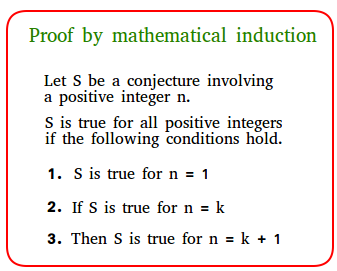Proof by mathematical induction
A proof by mathematical induction is a powerful method that is used to prove that a conjecture (theory, proposition, speculation, belief, statement, formula, etc...) is true for all cases.
Just because a conjecture is true for many examples does not mean it will be for all cases.
In order to show that the conjecture is true for all cases, we can prove it by mathematical induction as outlined below.
Important notes and explanations about a proof by mathematical induction

However, showing it is true for one million values or more still does not prove it will be true for all values. This is a very important observation!
In 2., since you have already shown that the conjecture is true for one or more values, it is logical to suppose or assume it is true for n = k or generally speaking.
We usually use the assumption that we make here to complete or prove 3.
In 3., you finally show it is true for any values. Notice that 2. did not show it is true for any values.
An example showing how to do a proof by mathematical induction
Show that for all n, 2 + 4 + 6 + ... + 2n = n ( n + 1)Step # 1:
Show the equation is true for n = 1, n = 2, .......
There is a pitfall to avoid here.
n = 1 means the first value of the expression on the left side. In this case 2
n = 2 means the first two values of the expression on the left side. In this case 2 + 4
n = 3 means the first three values of the expression on the left side. In this case 2 + 4 + 6
Thus, showing the equation 2 + 4 + 6 + ... + 2n = n ( n + 1) is true for n = 4 means that we have to show that 2 + 4 + 6 + 8 = 4 (4 + 1)
2 + 4 + 6 + 8 = 6 + 6 + 8 = 12 + 8 = 20 and 4 (4 + 1) = 4 × 5 = 20
Since the left side is equal to the right side (20 = 20) , step # 1 is done. It is not necessary to choose other values although you could do it just for fun and to prove to yourself that it will work for other values.
Step # 2:
Suppose the equation is true for n = k
Just replace n by k.
2 + 4 + 6 + ... + 2k = k ( k + 1)
Step # 3:
Prove the equation is true for n = k + 1
This is the toughest part of proof by mathematical induction. Things can get really tricky here. Not in this problem though!
At this point, you need to write down what it means for the equation to be true for n = k + 1
Be careful! Just because you wrote down what it means does not mean that you have proved it. This is another pitfall to avoid when working on a proof by mathematical induction.
After you replace k by k+1, you get :
2 + 4 + 6 + ... + 2 × (k + 1) = k+1 ( k + 1 + 1)
2 + 4 + 6 + ... + 2 × ( k + 1) = k+1 ( k + 2)
2 + 4 + 6 + ... + 2 × ( k + 1) = ( k + 1 ) × ( k + 2)
Let's give you a recap because you may have lost tract of what we are trying to do here.
We have not proved anything yet. The equation 2 + 4 + 6 + ... + 2 × ( k + 1) = ( k + 1 ) × ( k + 2) is just what it means for the equation to be true for n = k + 1
We are now ready to complete the proof by mathematical induction by using the hypothesis in step # 2.
starting with the hypothesis, 2 + 4 + 6 + ... + 2k = k ( k + 1)
Say to yourself, " What does the next term look like? "
Since the last term now is 2k, the next term should be 2 × ( k + 1)
Add 2 × ( k + 1) to both sides of the hypothesis
2 + 4 + 6 + ... + 2k + 2 × ( k + 1) = k ( k + 1) + 2 × ( k + 1)
= k2 + k + 2k + 2
= k2 + 3k + 2
Since 2 = 1 × 2 and 1 + 2 = 3,
k2 + 3k + 2 = ( k + 1) × ( k + 2)
Therefore, 2 + 4 + 6 + ... + 2k + 2 × ( k + 1) = ( k + 1) × ( k + 2) and the proof by mathematical induction is complete!
The above is a well explained and solid proof by mathematical induction. Study it well!